
Agatha Gregson, née Wooster, later Lady Worplesdon, is a recurring fictional character in the Jeeves stories of the British comic writer P. G. Wodehouse, being best known as Bertie Wooster's Aunt Agatha. Haughty and overbearing, Aunt Agatha wants Bertie to marry a wife she finds suitable, though she never manages to get Bertie married, thanks to Jeeves's interference.

Jeeves in the Offing is a comic novel by P. G. Wodehouse, first published in the United States on 4 April 1960 by Simon & Schuster, Inc., New York, under the title How Right You Are, Jeeves, and in the United Kingdom on 12 August 1960 by Herbert Jenkins, London.
Roberta "Bobbie" Wickham is a recurring fictional character in the Jeeves and Mr. Mulliner stories of English comic writer P. G. Wodehouse, being a mischievous red-headed girl who is fond of practical jokes. She is a friend and one-time love interest of Jeeves's master Bertie Wooster, and a relative of Mr. Mulliner.

Very Good, Jeeves is a collection of eleven short stories by P. G. Wodehouse, all featuring Jeeves and Bertie Wooster. It was first published in the United States on 20 June 1930 by Doubleday, Doran, New York, and in the United Kingdom on 4 July 1930 by Herbert Jenkins, London. The stories had all previously appeared in Strand Magazine in the UK and in Liberty or Cosmopolitan magazines in the US between 1926 and 1930.

The Mating Season is a novel by P. G. Wodehouse, first published in the United Kingdom on 9 September 1949 by Herbert Jenkins, London, and in the United States on November 29, 1949, by Didier & Co., New York.
"Jeeves and the Yule-tide Spirit" is a short story by P. G. Wodehouse, and features the young gentleman Bertie Wooster and his valet Jeeves. The story was published in The Strand Magazine in the United Kingdom in December 1927, and in Liberty in the United States that same month. The story was also included as the third story in the 1930 collection Very Good, Jeeves.
"Tuppy and the Terrier" is the second episode of the first series of the 1990s British comedy television series Jeeves and Wooster. It is also called "Bertie Is In Love" or "The Golf Tournament". It first aired in the UK on 29 April 1990 on ITV. The episode aired in the US on 18 November 1990 on Masterpiece Theatre.

"Aunt Agatha Takes the Count" is a short story by P. G. Wodehouse, and features the young gentleman Bertie Wooster and his valet Jeeves. The story was published in The Strand Magazine in London in April 1922, and then in Cosmopolitan in New York in October 1922. The story was also included in the 1923 collection The Inimitable Jeeves as two separate chapters, "Aunt Agatha Speaks Her Mind" and "Pearls Mean Tears".

"Scoring off Jeeves" is a short story by P. G. Wodehouse, that features a young gentleman Bertie Wooster and his valet Jeeves. The story was published in The Strand Magazine in London in February 1922, and then in Cosmopolitan in New York in March 1922. The story was also included in the 1923 collection The Inimitable Jeeves as two separate chapters, "The Pride of the Woosters Is Wounded" and "The Hero's Reward".

"Sir Roderick Comes to Lunch" is a short story by P. G. Wodehouse, and features the young gentleman Bertie Wooster and his valet Jeeves. The story was published in The Strand Magazine in London in March 1922, and then in Cosmopolitan in New York in April 1922. The story was also included in the 1923 collection The Inimitable Jeeves as two separate chapters, "Introducing Claude and Eustace" and "Sir Roderick Comes to Lunch".

"Jeeves and the Chump Cyril" is a short story by P. G. Wodehouse, and features the young gentleman Bertie Wooster and his valet Jeeves. The story was published in the Saturday Evening Post in New York in June 1918, and in The Strand Magazine in London in August 1918. It was also included in the 1923 collection The Inimitable Jeeves as two separate chapters, "A Letter of Introduction" and "Startling Dressiness of a Lift Attendant".

"The Delayed Exit of Claude and Eustace" is a short story by P. G. Wodehouse, and features the young gentleman Bertie Wooster and his valet Jeeves. The story was published in The Strand Magazine in London in October 1922, and then in Cosmopolitan in New York in November 1922. The story was also included in the 1923 collection The Inimitable Jeeves.

"Jeeves and the Unbidden Guest" is a short story by P. G. Wodehouse, and features the young gentleman Bertie Wooster and his valet Jeeves. The story was published in the Saturday Evening Post in the United States in December 1916, and in The Strand Magazine in the United Kingdom in March 1917. The story was also included in the 1925 collection Carry On, Jeeves.
"Jeeves and the Impending Doom" is a short story by P. G. Wodehouse, and features the young gentleman Bertie Wooster and his valet Jeeves. The story was published in The Strand Magazine in the United Kingdom in December 1926, and in Liberty in the United States in January 1927. The story was also included as the first story in the 1930 collection Very Good, Jeeves.
"Jeeves and the Song of Songs" is a short story by P. G. Wodehouse, and features the young gentleman Bertie Wooster and his valet Jeeves. The story was published in The Strand Magazine in the United Kingdom in September 1929, and in Cosmopolitan in the United States that same month. The story was also included as the fourth story in the 1930 collection Very Good, Jeeves.
"The Spot of Art" is a short story by P. G. Wodehouse, and features the young gentleman Bertie Wooster and his valet Jeeves. The story was published in The Strand Magazine in the United Kingdom in December 1929, and in Cosmopolitan in the United States that same month, as "Jeeves and the Spot of Art". The story was also included as the sixth story in the 1930 collection Very Good, Jeeves.
"Jeeves and the Kid Clementina" is a short story by P. G. Wodehouse, and features the young gentleman Bertie Wooster and his valet Jeeves. The story was published in The Strand Magazine in the United Kingdom in January 1930, and in Cosmopolitan in the United States that same month. The story was also included as the seventh story in the 1930 collection Very Good, Jeeves.
"The Love that Purifies" is a short story by P. G. Wodehouse, and features the young gentleman Bertie Wooster and his valet Jeeves. The story was published in The Strand Magazine in the United Kingdom in November 1929, and in Cosmopolitan in the United States that same month, as "Jeeves and the Love that Purifies". The story was also included as the eighth story in the 1930 collection Very Good, Jeeves.
"Indian Summer of an Uncle" is a short story by P. G. Wodehouse, and features the young gentleman Bertie Wooster and his valet Jeeves. The story was published in The Strand Magazine in the United Kingdom in March 1930, and in Cosmopolitan in the United States that same month. The story was also included as the tenth story in the 1930 collection Very Good, Jeeves.









